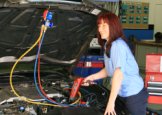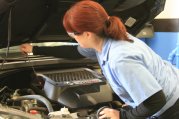
"They [EVC teachers] take the time to spend with you to get something down. I've gotten stuck on some of the stuff. They're always around in the shop area, and they're always willing to talk to you after class or if you need help with anything..."
|
|
Career Path:
Many graduates pursue positions as auto technicians and electrical diagnostic technicians. As technicians advance their skills and become faster at repairs, they often receive efficiency bonuses for repairs done quickly. Technicians with good communications skills may advance to positions as service writers or dispatchers in an automotive repair facility, parts manager, service manager, finance manager, or general manager.
This program also prepares students for many other job opportunities that take advantage of the training in mechanical and computer controlled devices. A few such opportunities include:
- Dealer parts/service manager for a car dealer
- Automotive insurance claims representatives
- Automotive Technology Teachers
- Mechanical maintenance and repair of production equipment in manufacturing or distribution environments
- Elevator, escalator and building maintenance
- Amusement park ride maintenance
Graduates from the automotive technology program can get jobs anywhere in the world!
Nature of the Work:
Automotive repair work involves both hands-on repair work and problem-solving. Entry level workers may do more hands-on work such as oil changes, tire rotations, battery installations. Repair work may at times require physical strength, but assistive devices are available to help with heavy lifting and wrenching. Often, the work involves working with hand tools in tight spaces and replacing intricate parts or sensors.
As workers develop more skills, problem-solving plays a bigger role. Current model cars are 90 percent computer controlled - most cars have as many as 20 computers that are networked, as well as satellite uplinks for global positioning systems (GPS) for navigation. Technicians use high technology diagnostic devices to assist them in determining problems. Devices include computer alignment analyzers to measure the angularity of wheels and suspension components, and diagnostic scanners. These scanners bring up data from sensors throughout the car, allowing the car's computers to communicate data to the scanner or to a laptop computer.
The technician analyzes the data from the sensors to determine the problem and the diagnostic code. Then, the technician consults the service literature for that code to determine the procedure to correct that problem and makes the repair.
More changes in the nature of the work are expected as sophisticated systems combine GPS and other data from radar and photo-optic sensors to actually help drive the car using voice-activated controls.
Work Environment:
The work environment combines the typical elements of a garage environment, including lifts, tools, engines and parts, with high tech diagnostic equipment and computers used to diagnose problems. Because of the many changes taking place with increased computer control of vehicles, global positioning systems, and other high technology, the repair work tends to be less strenuous and may require more intricate replacement of small sensors, which can be an advantage for women.
Specific Jobs Available to Graduates:
In addition to positions as auto technicians in their general or specialty areas, graduates of the A.S. degree programs have more access to positions requiring strong communications skills, such as service writing, parts or tool distributor, dispatchers who determine the work flow, parts manager, service manager, finance manager, or general manager.
Graduates of the more specialized certificate programs can expect to find work in their specialty area. For example, someone who wants to work with tires could complete the Basic Skills certificate and the Drivetrain and Chassis certificate in one year and be eligible for work in a tire shop.
Industries Employing Graduates of this Program:
The auto industry is the primary employer, but many other industries also hire graduates, including the any company with mechanical components. This might include working on trucks or package distribution conveyor belts at UPS, elevator and escalator repair companies, manufacturing companies with production equipment or assembly lines, copier companies, and other mechanical industries.
EVC has partnerships with many employers in this industry who are glad to hire graduates of the program, including Sears, Pep Boys, Wheel Works, Goodyear Tire stores, various automotive dealers, and many more. EVC also offers a special certificate program in collaboration with Honda, and works with the cities of San Jose and Sunnyvale, and the Northern California Automotive Dealers Group to develop career opportunities for students.
Course Description:
Degrees or certificates offered:
- Fuel and Electrical
or - Drivetrain and Chassis
Five certificate programs:
- Basic Skills
- Drivetrain and Chassis
- Engine Service
- Fuel and Electrical
- Advanced Automotive Training (combines content from all of the above certificates)
EVC also partners with Honda to offer the Honda Professional Automotive Career Training (PACT) program, which is similar to the Advanced Automotive Training certificate program, but also includes Honda-specific learning modules.
Content covered in basic instruction:
Content covered in basic courses includes specific detailed learning tracks in all of the above general subjects, as well as hands-on learning modules and internships.
Visit the Automotive Technology website for more information about degree, certificate, and the Honda PACT program requirements.
Prerequisites:
This program has no specific prerequisites. However, a high school education or GED is recommended as well as a reading level 2 and math level 2, since reading and math are quite helpful in the program. You can find out your reading and math levels by contacting the Assessment Center and taking the appropriate assessment tests.
Hours Offered:
This program offers classes Monday through Thursday from 8:00 a.m. to 12 noon, 1:00 to 5:00 p.m. and 6:00 to 10:00 p.m. Saturday classes are offered from 8:00 a.m. to 12 noon and from 1:00 to 5:00 p.m. Class offerings vary by semester, but most classes are offered at least once a year.
The Honda program also offers 50 percent of its classes online.
Length of Program:
The A.S. degree program requires 61-63.5 units, depending on the emphasis selected, including the required general education classes. It can be completed in two years.
The certificate programs vary in length from 12 to 59 units. Most students complete a certificate program in two years (four semesters), but others speed up or spread out coursework due to other obligations.
Students wishing to take all the automotive courses and complete their A.S. degree usually take three years to complete the program.
Financial Aid Contact
Tutoring Contact:
Tutoring Center
Room LE-200
(408) 274-7900
http://www.evc.edu/tutoring_center/
A small amount of preparation can help make your days in the classroom go more smoothly. Visit the CalWomenTech Learning Library to find software and other tools to advance your math, spatial reasoning skills and much more. Visit the Tutoring Center to find out how tutoring can help.
 Copyright 2010 National Institute for Women in Trades, Technology & Science | http://www.iwitts.com |



